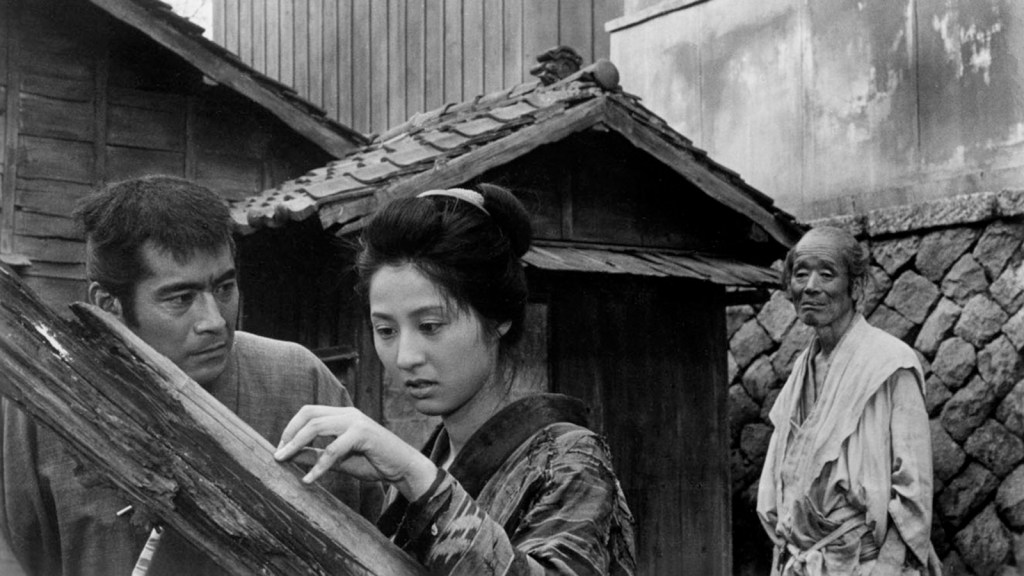
Director Akira Kurosawa
Screenplay Akira Kurosawa, Hideo Oguni based on the book by Maxim Gorky
Starring Toshiro Mifune, Isuzu Yamada, Kyōko Kagawa, Ganjiro Nakamura, Kōji Mitsui , Kamatari Fujiwara, Akemi Negishi, Minoru Chiaki, Eijirō Tōno, Eiko Miyoshi, Bokuzen Hidari
The Lower Depths is a remarkable attempt to bring the messages of Gorky’s original play into the modern arena of thought in Japanese life, circa 1957. The time in which it is placed is almost irrelevant. The destitute seem to lose track of time in their libations and in its subsequent misery. Every day like this.
In a broken down rental flat, literally a rock bottom floor with rooms carved into a wall, there are many lowlifes just scraping (sometimes literally) to get by. These include a thief (Mifune), who is doing alright when he’s not in jail. His rugged good looks give him an in with the wife of the landlord (Yamada), but he likes her sister (Kagawa), and wants to get out with her.
There is an actor (Fujiwara) who has lost so much to alcohol, his teeth, his mind and his “bitol organs.” There’s a gambler (Mitsui) who gets along well enough because he knows the score. There is an ex-samurai (Chiaki) who may not be all he says. The tinker (Tōno) who toils away as his ailing wife (Miyoshi) is dying in agony. Then there is a young prostitute (Negishi) who is just about to break, for losing her love.
Into this miserable world walks an old, happy man (Hidari) who has something positive and distinct to say for everyone. This is enough to get several of the stories to explode into the open.
Through most of the film this cast is ACTING, as if in a well produced play. The performances range from good to excellent. Most of the cast is on par here. They’ve brought their ACTING (cue Jon Lovitz) game. In this environment, Hidari and Mitsui are most at ease. It’s because of their performances that the others are allowed to shine.
To say there is a storyline to The Lower Depths is kind of a stretch. There are several small storylines, each adding to a certain misery or bland but pleasant drunkeness.
The feel of the work is a search for a meaningful place in the society they inhabi. In this, it is like much of the entertainment was heading for in the mid/late ’50s. It’s not surprising the Russian socialist realism movement would be such a force during this time. It was aggressively being rooted out in the States. In Japan, the rules allowed a bit more understanding of the roots of these concepts.
What’s more, the language of the film is far beyond what censors would allow in the U.S. at the time. Many phrases that didn’t become regular until the cinema of the ’80’s flows naturally here.
Almost to the end, Kurosawa is on top of his game here. For most of the film, it just feels like he is showing off. Working a movie out of what really should be a play and making that presentation enjoyable is a difficult. By now, it feels like nothing is a challenge for the director.
Ultimately, the film feels like it lasted about 30 minutes too long. We see the cataclysmic action as the end of the 2nd act. That is just too much time to ponder as a punctuation mark and many good lines lose their power here.
There are many excellent performances here. There are so many that Mifune’s isn’t even in the top five. This is definitely due to Kurosawa getting the most from players that worked with him regularly. The best one hadn’t worked with him before.
Mitsui, who I hadn’t seen before, comes of somewhere between James Garner and Henry Fonda. He’s an incredible actor with no sense of fear. His gambler is a visceral treat. He is real and relaxed, with no sense of pride or regret. Or maybe he’s enough of a gambler to keep us from thinking he has either feeling. He is so subtle, we don’t realize we’ve been had until the last line.
Hidari is equally pleasant. He is an old man, and the urge from the rest of the cast to overlook him are very solidly rebuffed. He has a simple, disarming honesty that gives each character an important chance for self reflection.
The best point in the film has Mitsui’s gambler looking right through Hidari, just before the old man leaves. It’s worth the price of the film to see each as they react to the other.
The women of the film range from conniving to hysterical. The acting for all of the women is remarkable despite the limitations of the material. This is not a film that helps one understand women as it wants to understand men. It’s just not one of the goals deemed relevant during the era.
In all, The Lower Depths is worth viewing for the building of a miserable, yet still lovable world. The sound is carefully orchestrated to prove emotional points, and that it does. Whether it’s the endless sound of scraping of a bowl to the rhythmic prayers of a giant man with an injured arm. one is transfixed.
The weakness is in the material, and for this, mostly the ending. It gets to the point where we realize, oh, its a play only that once. It is enough to unsettle the viewer to realize it isn’t a cold floor they’ve been sitting on. You’d think that would be a good thing to realize. But it isn’t. I would much rather be sitting within the group of drunkards, learning nothing. Instead we get one clear moment that we’ve been preached at in the comfort of our warm couch.
(**** out of ******)

Leave a comment